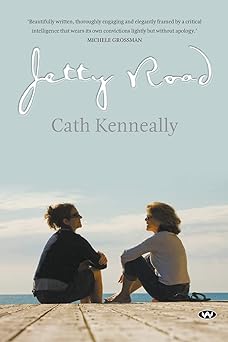
- Free Article: No
- Contents Category: Fiction
- Review Article: Yes
- Article Title: Drowning in Detail
- Online Only: No
- Custom Highlight Text:
Cath Keneally’s second novel, Jetty Road, is set in the beachside suburb of Glenelg, South Australia. Her subject is the relationship between two sisters in early middle age, and the narrative is fabricated from the daily happenings of their lives. Evie, the older sister by several years, has no children and ekes out a living in a number of part-time jobs as a child-care worker. Paula, matron of an aged care home, has two children: Bert, aged nineteen, and Rosie, six. Neither of the sisters is married.
- Book 1 Title: Jetty Road
- Book 1 Biblio: Wakefield Press, $24.95 pb, 378 pp
- Book 1 Cover Small (400 x 600):

Evie and Paula, close siblings, live near one another so that the former can help look after Rosie. Keneally’s fiction is about the quotidian, and there is a strong feminist undertow, with details of domestic interiors and house-hold chores: cleaning, shopping, cooking and drinking cups of tea with family. Preoccupation with the body is strong. Paula struggles with her periods and reflects upon the ways in which menstruation can shape a woman’s experience. This evoked a sense of second-wave feminist fiction and, for me, a flash of ‘get over it’ impatience. Evie, in her mid-forties, speculates that her lingering beauty can’t last much longer. Relationships with children are important to both women; this is complemented by Paula’s respect for, and imaginative commitment to, the aged people in her care.
The sisters’ lives seem harmonious at first, but in each character’s conscious and subconscious experiences run darker narratives. Evie relives in dreams and disturbing memories her dangerous former life in Melbourne. Involved with the abusive Ronnie, she was a drug user and worked in a brothel to support her habit. Kate Holden’s memoir, In My Skin (2005), seems influential here, but, unlike Holden’s parents, Evie’s family knows little of her past except for a vague awareness of the destructive and manipulative Ronnie. Paula and Evie are tentatively beginning new relationships with men; each of them is learning to trust again and wondering whether she needs a man in her life.
Paula’s memories are central to her subjectivity. She often reflects on her early, failed marriage to Gary and her escape with him to Perth for several years. Family is an important theme in this novel; the sisters are two of six children in a once-devout Catholic family. Each sister experienced that family context differently: Evie has happy memories, but this was before the younger children arrived and when money was plentiful. Paula, the second youngest, has less sanguine memories. She recalls her deceased parents’ rows and the scalding impatience and endless drudgery of her mother, Dot, who took up teaching to support them all, the father being hopeless with money. Dot’s prudish outrage at Paula’s emerging sexuality and early pregnancy still fester in her daughter’s mind twenty years later; she wonders if it was menopause that caused her mother’s anger. When Evie tries to read some of her parents’ newly discovered love letters, Paula won’t listen.
For Evie, the comforting rituals and pieties of her Catholic childhood are a particular preoccupation, a heritage that she believes she has outgrown but which still dominates her psyche. Ironically, this past seems inescapable. Evie notices one of her former teachers, a nun, standing before her in the queue at the supermarket, and speculates on the vigorous intellectual curiosity of the women in the convent, who escaped the confines of domestic drudgery and Catholic motherhood. Feeling inadequate and fraudulent, Evie now volunteers for a Church help-line. Paula, however, is well and truly over Catholicism; she regards the worldly chaplain at her nursing home with amused contempt.
Evie and Paula share an abiding grief over their little brother Sean, who died several years earlier in a drug-related incident; the sisters believe they failed to protect him. This grief is acted out in their protectiveness towards Bert, who is drinking heavily and experimenting with party drugs.
There is too much going on in this long novel; I found myself struggling to recognise all the characters by name. Dialogue dominates the prose, wearyingly at times, especially when it strives to be hip and colloquial. Big things grow from the myriad details of the plot, but when they come the tension has been dissipated by the very slow accretion of daily minutiae. This is a likeable novel about well-observed, recognisable people, but for more effect, Keneally might consider a leaner narrative.


Comments powered by CComment